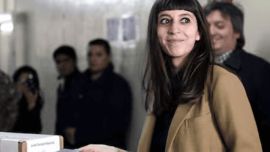The Governor of Buenos Aires Province María Eugenia Vidal agrees that "this year was a difficult year for people" and promises she is working hard in areas of social support and security to ensure a quiet December. The Cambiemos coalition's most popular figure also suggests she is not concerned about electoral strategy, having ignored the polls for several months.
In an exclusive interview with Perfil, Vidal sat down to discuss the ongoing wage conflict with provincial teachers, the death of an activist, and the so-called "fake receipt" electoral scandal which has implicated Cambiemos and members of her team.
You're about to experience your third December as governor. What do you expect?
I've been through 10 Decembers (in politics) since I started working as Buenos Aires City Hall's Social Development minister. You don't work on December when you're still in November. All the province's social programmes have increased in the last three years, above inflation, and have expanded their reach. There are now 40 percent more Buenos Aires residents receiving social support. This is a government which is present in the context of a year that greatly impacted food prices.
Are you worried about security in Greater Buenos Aires during the holiday season?
The vast majority of Argentines and residents of Greater Buenos Aires do not want conflict. They want peace, including political, social and union leaders; if there are problems, it is the result of a radicalised minority, which is going to be exposed.
Have you detected groups which want to provoke disturbances?
We have a round table which permanently monitors all conflicts in a province with very high levels of poverty. We are constantly aware. For me, poverty is not synonymous with violence. We are also deploying police, not only in a social sense but also in a security sense. We always increase security on the streets in December. And since last year, we are also able to keep police at tourist sites.
Could we agree that 2018 ends with a very strong economic crisis?
Undoubtedly it was a very difficult year for people. It is also certain that we did not abandon Buenos Aires residents. Our biggest efforts were concentrated in maintaining jobs in small and medium businesses, maintaining public works projects, and adding to efforts to distribute food.
Which sectors have been most affected by the crisis?
Inflation affects everybody, those who receive state support but also the worker who gets up every day to go to work.
Social leaders blame the police for the death of activist Rodolfo Orellana during a land grab in La Matanza. Are you worried about this?
Any death worries me and I'm worried also about Orellana's death. I feel so sorry that something like this has happened and I hope the Judiciary can determine what happened as soon as possible. If there were police excesses, then I can take all the measures required. We have not had any qualms in removing police for corruption and institutional violence. In the same sense, I cannot be unfair if the police had nothing to do [with Orellana's death]. It is in the hands of the prosecutor, whom we gave a list of the police who intervened and a list of the 911 calls, because the situation remains unclear.
In the backdrop is another concerning issue which is the land grabs...
This is a problem across Argentina. The national government's work in this area is historic, as was the inaugural study to identify case-by-case and elaborate a bill to assign land; we must move forward rapidly in this sense.
Do you have statistics about the growth of shantytowns?
The province has more than 1,000 irregular urban areas and this has happened over many years. It is related to a lack of land and the impossibility of accessing housing. We must change the way land is offered in Argentina. We must also recover the mortgage market for the middle class. There is a need to change the mechanisms in which Argentines access social housing. This must be the outcome of a process, not a case of whoever is the strongest gets the land.
There is already talk about the 2019 general and presidential elections. Are you going to try to split the provincial elections from the national race?
I have not spoken about that, not in public nor privately, and I will not. It is not time to define the electoral calendar or candidacies. I am concentrated on carrying out outstanding tasks, visiting schools, hospitals and not thinking about the electoral calendar or candidacies. There will be time for that.
Is there time?
Yes. Those who cannot wait are retirees, workers, those who need food. This is why we've announced a bonus for public workers and retirees. The candidacies can definitely wait.
Macri says he is ready for reelection...
The president has always spoken about reelection when asked, not because he wanted to announce it. His is the most important candidacy to determine, the rest will follow after it.
Are you ready for reelection?
My priority is to end my mandate well. And above all, more than ever, to accompany the people. The rest can be debated among Cambiemos and with the President further down the track.
How do you handle consistently polling better than Macri?
The polls are a snapshot.
But that snapshot repeats itself time and time again...
It's been months since I last looked at the polls. My team sees them but do not tell me; they worry about that. I believe Mauricio (Macri) has always been generous towards me. And the place I occupy is thanks to him giving me the chance. Ours is a relationship of over 16 years, which does not change because of a fortuitous political factor. Beyond my personal bond, I will continue to be part of Cambiemos.
We're again speaking about Cristina Fernández de Kirchner in electoral terms. How do you evaluate this factor?
The Kirchner movement never left the political scene. It was there in 2015 and 2017, and it will come back for the elections. Beyond Cristina, there is a sector of society that feels represented by that movement. In as much as that remains the case, that movement will continue to exist. Cambiemos represents something that came from the people and it will continue to represent this as a political space in 2019.
What do you make of some Peronists realigning?
I find it valid that they should organise themselves as an electoral force. Opposition forces must define what they will offer society in 2019.
Do you think the polarisation with Fernández de Kirchner is a risk for Cambiemos?
Cambiemos does not promote polarisation, rather it comes from society. There is a sector that chooses the Kirchner movement and others than choose Cambiemos. We do have the responsibility to avoid creating division when it comes to who is the good guy and who is the bad guy.
But it would seem that the national government has not contributed to the unification of Argentines like it had proposed. It speaks of the Kirchners as the past and as a synonym of corruption...
One thing is the voter and another is the politician. If a political movement has several dozen corruption cases against it, which are moving forward in oral trials and with leaders in jail, to not speak about corruption is to deny reality. A movement that governed for 12 years is part of the past. If it is part of the future, then that is a decision of the people.
Is your team working on the elections?
The elections begin in July. A team always thinks about the next election but the majority of our energy is not placed there.
And how much energy do you invest in the next election?
Nothing, nothing. Only answering the questions of journalists. Nothing, truth be told. I have not had a single meeting about this.
You end 2018 without having concluded teachers' collective wage bargaining, which is a first for the province in many years...
Well, we still don't know because we have a meeting to call before the end of the year. We do not want conflict. That is reflected in the 19 meeting we have had and in the 11 proposals we have made. We are in agreement with the vast majority of unions. I find it hard to understand why they have carried out these strikes against the IMF (International Monetary Fund) and the Budget, to (union kingpin Hugo) Moyano's favour, or in solidarity with the shipyard workers. They must find consensus before the end of 2018.
What is your take on the so-called "fake receipt" scandal involving the Cambiemos campaign in 2017?
The courts have decided the jurisdiction, after a process that lasted months. We presented our partial findings to the Ombudsman, which I ordered, and I hope it keeps moving forward in the Judiciary. I have shown my face from day one and done what I had to do. I requested an audit, I removed those responsible for the campaign's accounting and I rest easy knowing anything can be investigated.
Do you think it is just an issue of jurisdiction and the source of the funds should not also be invesigtated?
The background of the case determined that the electoral judge should first investigate and if necessary it would move to the Criminal sphere.
Federal Judge Sebastián Casanello has complained that the case was taken form his office and sent to La Plata...
I did not hear any public declaration in this regard. All complaint were made, the first level judges intervened, as well as distinct federal chambers, which agreed in their rulings and a that [an electoral] judge should investigate.
There was a campaign against the judge who refused to jail Pablo Moyano (the head of the Teamsters' Union). Do you not think that this was an interference in the Judiciary?
I don't share that view. The accusations against Carzoglio come from previous cases. And in the impeachment tribunal we did not have majority and in no [other] way could we discipline a judge.
What can you tell us about the demand of mayors for subsidies?
We agreed to take on provincial transport subsidies and we asked them to take on the municipal ones. The majority of municipalities will end their year well in economic terms because they received, throughout the year, resources from the Province. If the municipalities have any problems, we will review them case-by-case.
And if the mayors cannot take on those costs and end up passing them on to passengers?
The national government was also unable to take charge and the province faces a deficitary situation. The majority of the municipalities have no deficit. A mayor who does not use the resources which abound or who has them deposited in the bank is making a political decision.
What is the current situation with casino tenders? It seems like a big company like Boldt could end up with all of it...
It is the first time in 23 years that we (the province) will handle tenders directly. This means there will be greater offers. It is a transparent process. I would have liked to receive more international interest but this was limited by the exchange rate. That was certainly a shame.
This article was originally published in Spanish in Perfil.


























Comments